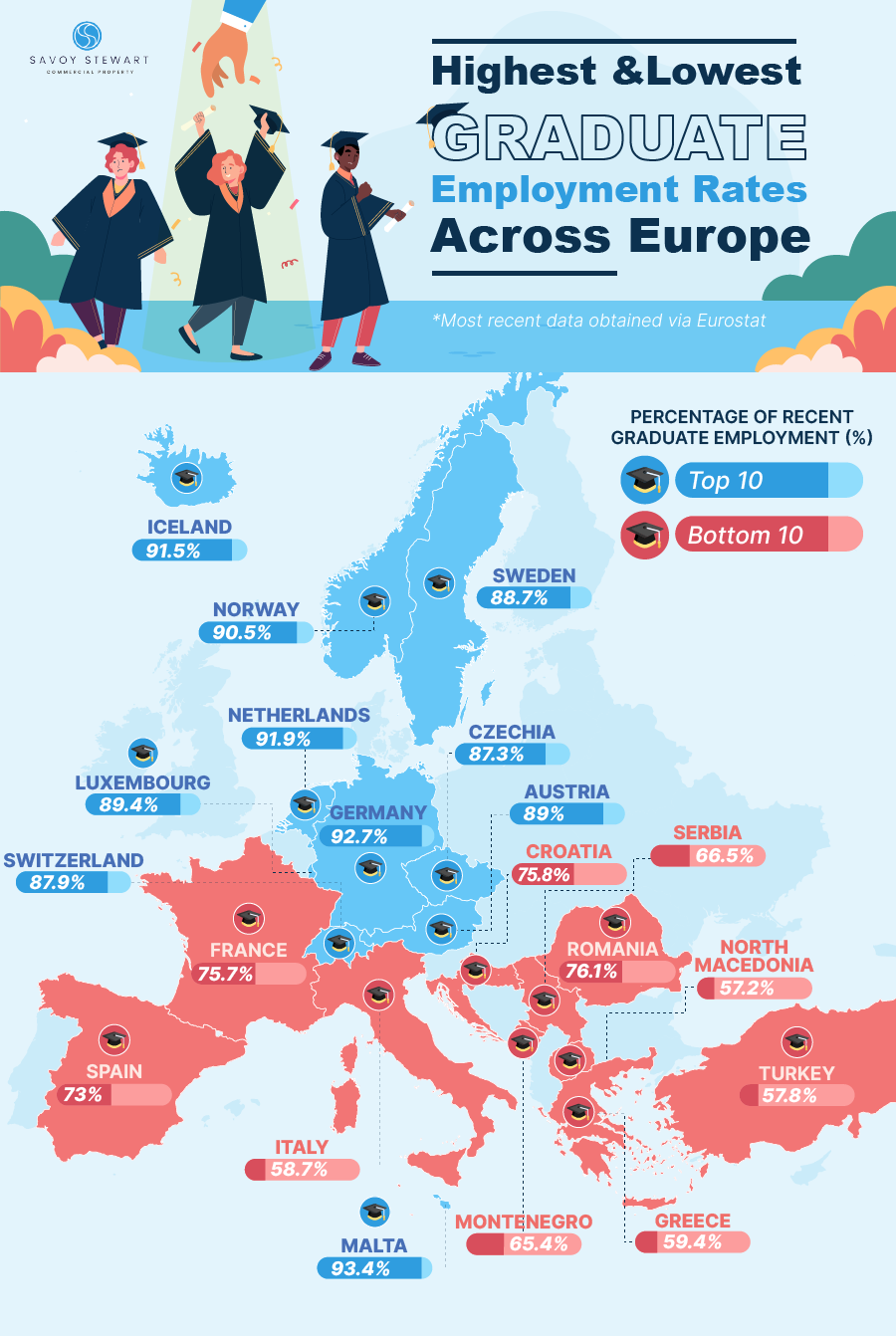European countries with the highest graduate employment rate

- Recent graduates in Malta have the best chance of finding employment with rates at 93.4%
- In second place is Germany – 92.7% of recent graduates are employed
- North Macedonia’s graduate employment rate is the lowest in Europe (57.2%)
- Turkey (57.8%), Italy (58.7%) and Greece (59.4%) are also among the worst in Europe
- Savoy Stewart’s Darren Best provides his top tips for graduates on CV writing and standing out from the crowd
Coronavirus has made finding employment hard over the past year, especially for new graduates. So with recent studies showing which skills will help you most in getting a job, does location have an effect too?
Savoy Stewart sought to find out by analysing recent Eurostat data. They can now reveal the countries in Europe with the highest and lowest graduate* employment rates.
Where are the highest graduate employment rates?
Malta has the highest graduate employment rate across Europe! With a whopping 93.4% of recent graduates employed, it seems Malta’s workforce is strong – the pandemic’s effects on these numbers will be interesting to see.
In second place is Germany with graduate employment at 92.7%. The stats are a testament to Germany’s impressive education system and decade-long employment boom.
Clinching third and fourth are the Netherlands at 91.9% and Iceland with an equally impressive 91.5%.
Making the top 12 countries with the highest graduate employment rates include:
- Norway – 90,5%
- Luxembourg – 89,4%
- Austria – 89%
- Sweden – 88,7%
- Switzerland – 87,9%
- The Czech Republic – 87,3%
- Slovenia – 86%
- Hungary – 85,6%

Where are the lowest graduate employment rates?
Flipping the results, the European country with the worst employment rates for graduates is North Macedonia – a shockingly low 57.2%.
Following North Macedonia is Turkey with 57.8%. Social unrest and political repercussions may be to blame for low numbers here.
Also battling economic issues, Italy and Greece follow with 58.7% and 59.4%, respectively.
Other European countries with low graduate employment rates include:
- Serbia – 66,5%
- France – 75,7%
- Croatia – 75,8%
- Romania – 76,1%
To help recent graduates improve their job prospects, Darren Best from Savoy Stewart has provided his top tips on CV writing:
- Be clear and concise – Hiring managers will likely be sifting through CVs even faster than usual, so initial appearances mean everything. Keep your CV concise with a mix of formats and the important info obvious, so the reader will focus on what matters most: your credentials.
- Be visible and shout your achievements – Make it easy for employers to find out more about you by creating a professional online profile (e.g. LinkedIn) and regularly update it with your latest achievements. Shouting about your success is a sure-fire way to grab someone’s attention.
- Get creative – More and more people are growing to the concept of creative CVs. With such fierce competition out there, it may pay to take a risk and make you and your CV more visible. Try new templates and (especially for a creative role) alternative ways of applying for a job and you might stand out!
- Highlight relevant experiences – With more people out of employment, there may be higher qualified individuals going after the same jobs as you. To snatch a job from experienced applicants, first and foremost highlight the skills you have that will transfer directly to the job at hand.
Source: Savoy Stewart








Make a report about the salaries and where hungary is at compared to E.U.